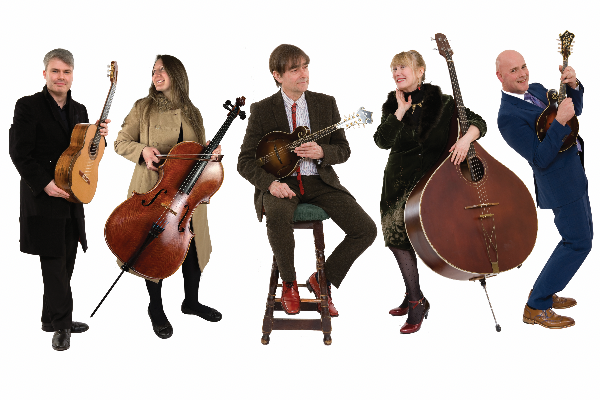Directory
Simon Mayor and friends

"One of the world’s great mandolinists"
"A demon on the mandolin, an angel on the fiddle. Simon Mayor creates music that borders on the divine... towering performances."
Quintet - Vocal & Instrumental
Instrumentation
- Simon Mayor - mandolin/mandola/fiddle
- Florence Petit - violoncello, mandocello
- Elias Sibley - classical guitar, mandolin, mandola
- Hilary - voice, mandobass (bass mandolin)
- Richard Collins - mandolin, mandola, banjo
Repertoire
Celtic-Baroque and much more, spiced with a delicious sense of fun!
Celebrating the melodies of Ireland's national treasure and 'Father of Irish Folk Music', Turlough O'Carolan (1670 - 1735), alongside Carolan's Italian contemporary and friend, Vivaldi. This is a programme spiced with anecdotes, poems and beautiful renditions of Irish and Scottish traditional songs before stepping into twentieth century world of ragtime and hot swing!
Programme (short selection):
Carolan's Concerto
Concerto for Two Mandolins - Vivaldi
Si Bheag Si Mhor - Carolan
The Snowy Breasted Pearl - Carolan (song)
Salley Gardens - (song)
The Buttermere Waltz - Mayor
They All Laughed - Gershwin (song)
Biography
'One of the world’s great mandolinists' leads an illustrious, witty and virtuosic collective on mandolins, mandola, mandobass, violin, ‘cello, classical guitar and voice.
‘A demon on the mandolin, an angel on the fiddle. Simon Mayor creates music that borders on the divine… towering performances.’ Irish Music Magazine
In the wake of the release of his critically acclaimed album ‘Carolan’ (fantasias on themes by Turlough O’Carolan 1670-1735), Simon has gathered together musicians from traditional and classical musical backgrounds - Florence Petit (violoncello & mandocello), Hilary James (mandobass & vocals), fellow 'Mandolinquent' Richard Collins (mandolin, guitar, banjo, bass), and Elias Sibley (mandolin, classical guitar, ukulele).
Simon Mayor writes:
Carolan’s loss of sight through smallpox at the age of eighteen caused an intriguing twist to his legacy. Unable to notate his own music, those who did failed to record the harmonies he must have used, given that he played a polyphonic instrument, the harp. It was an unfortunate omission for anyone wishing to recreate his music with absolute historical accuracy. For me, this was never a strong desire, not least because I don’t play the harp! On the contrary, the ‘bare bones’, ‘melody only’ approach of his archivists had always proved alluring in itself. I wasn’t bound by the perceived constraints that hang over the music of more meticulously documented composers.
Because the task of archiving Carolan wasn’t undertaken to any large degree until some years after his death, some have argued that it would be impossible to notate so much music from memory, but this is not true. Those who play traditional music, and in particular those of us who have not been through music college, are usually blessed with well developed musical ears (helped in my own case by a father who taught me to sing in tonic sol-fa as a child). The traditional musician can easily memorise tens or even hundreds of tunes.